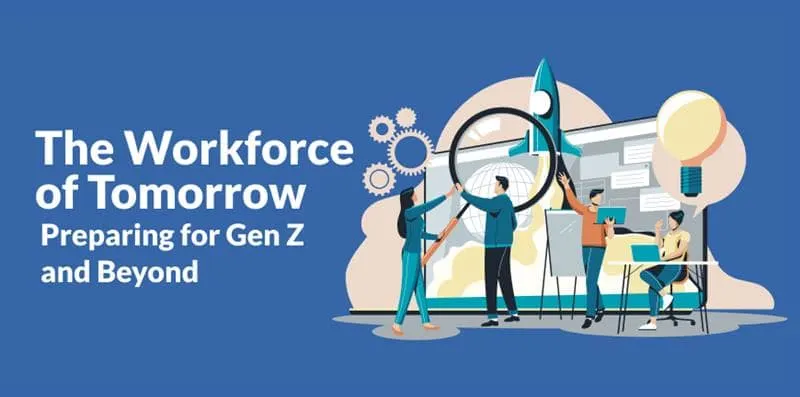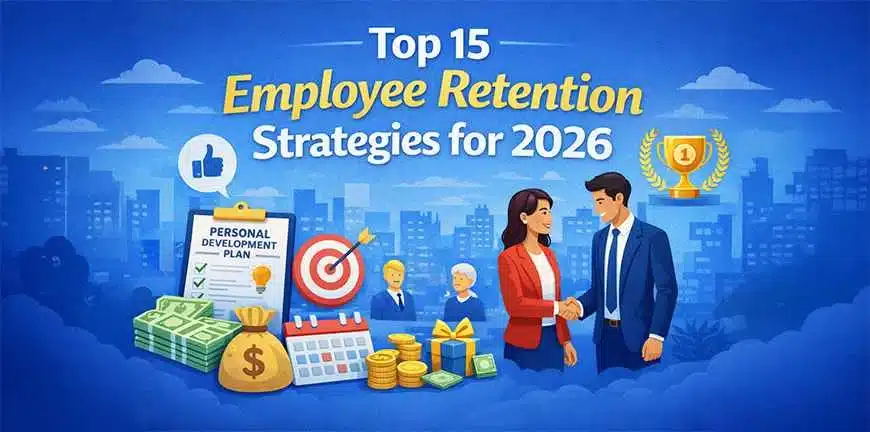
What Is a Managed Security Service Provider (MSSP)?
11/07/2025
What Is GST Compliance? Meaning, Checklist & Benefits
11/07/2025A bold new age is unfolding before our eyes, with the workplace experiencing a shift in generation as the Gen Zs and the Gen Alphas are here to rule. Organizations must gear up for the momentous transformation as the new brigade is not just seeking mere digital alterations; they cultivate value, are highly connected, and intensely focused on innovation and purpose.
Employers, brace yourself for the challenges and opportunities that lie in catering to their expectations while preparing future-ready workforce formulas.
Meet Gen Z and Gen Alpha
One of the most diverse generations to now in terms of ethnicity and race is Gen Z. They have a practical and enterprising approach and were raised in the backdrop of economic vulnerability and climate crisis issues. They grew up using smartphones and social media, driving them to become swift, tech-experts, and have access to information anytime.
Gen Alpha, hot on their heels, is likely to enter the workforce by the middle of the 2030s and take the space by storm. They will be a generation, technologically ingrained, honed by AI, climate change, and hybrid learning landscapes.
Key Features of the Next-Gen Manpower
1. Tech-Insight and AI-Comfortable
Gen Z is well-versed in using digital tools, from generating productive solutions to social activism. They will expect their employers to be equally tech-savvy, utilizing AI, automation, and smart channels to make the work experience more meaningful and efficient. Gen Alpha will be more demanding, and they likely would expect more enhanced experiences like AR/VR merger, real-time skill improvements, and gamified learning methods.
2. Mission-Driven and Value-Centric
For Gen Z and Alpha, a pay check does not serve their purpose alone. They want their efforts to matter. This generation wants employers who don’t just talk about environmental and ethical issues but walk an extra mile to make changes happen in these areas. Companies with a clear take and who are effort-driven towards sustainability, impartiality, and social responsibility draw stronger engagement.
3. (DEI) Is Non-Negotiable
DEI is an expectation and not a good-to-have strategy. Gen Z seeks a work environment that promotes gender parity, mental health assistance, along a flexible roadmap for growth. Leaders are expected to be allies and not just bosses, representing their team’s faithfulness and productivity.
4. Flexibility: The New Normal
9-to-5 is a long-gone rule, especially for the new generations who prioritize flexible working modes, not calculating hours, but how and where they work. Hybrid, project-based setups and nonsynchronous collaboration are what their ideal work-life balance entails.
5. Learning-Obsession and Growth-Centric
Gen Z seeks the upgradation of skills as an integral part of their work route. They look for employers who care about their development by investing in short form learning, offering certificates, tutoring, and real-time response. Gen Alpha, which is used to AI tutors and adaptive education models as they grew up with these systems, will expect a more personalized touch in their career path.
Digital & Learning Trends
- 98% of Gen Z own a smartphone; 83% own a laptop.
- 78% prefer microlearning, and 84% use smartphones for training.
- 72% thrive in mentorship or peer learning programs.
- 76% pursue certifications alongside work.
- 82% engage more with personalized learning paths.
- 57% already use generative AI at work; 63% worry AI will eliminate jobs.
- 59% believe AI skills are required for career advancement.
What are the Challenges for Employers?
1. Lessening the Gap
Workplaces have turned into spaces that include individuals belonging to five different generations. Organizations will find it harrowing to align old corporate systems with emerging workforce demands. A little disarray in communication patterns, value systems, and priorities that widely vary might lead to recoil or attrition.
2. Digital Burnout vs. Demand
HR leaders and employers must strike the right balance between cultivating digital efficiency and safeguarding employee welfare. The new generations are digital masters, but they are more than aware of tech fatigue.
3. Retention in a Job-Switching Culture
Gen Z and Gen Alpha are generations who are more likely to switch careers than previous generations if their expectations are not met. Building loyalty will require a lot more effort, like constant engagement, regular feedback systems, and transparent career progression opportunities.
Strategies for Future-Prepared Workplaces
1. Restructuring Onboarding and Culture for Gen Z
Today, onboarding is not about filling forms and completing paperwork-related formalities. With Gen Z on board, their motive is to seek meaning, instant results, and a robust connection from the inception of their employment drive.
HR leadership and employers must make them aware of an organization’s value, vision, and compelling stories through effective storytelling formats like testimonials, podcasts, or live virtual tours. Initiate programs like day-in-the-life with peers across domains. Build relations through mentorship sessions and include gaming experiences and training modules to keep the next generation engaged.
2. Invest in Employee Experience (EX)
In the age of Gen Z and emerging Gen Alpha talent, employee experience is no longer a choice; it’s a business imperative. Companies any which way harp on customer experience to foster loyalty and growth; they must now acquire the same mentality to draw, engage, and retain quality talent from the next gen working lot.
Organizations can design journey maps, enabling brands to identify topical issues and enhance experiences. HR and business leaders must apply the same approach to EX driving analysis and improving each stage of the employee lifecycle.
Technology must be utilized not just to smooth administrative operations, but to facilitate real-time feedback, tracking goals, and career crafting, empowering employees at every phase.
3. Create Multi-Generational Teams
Organizations today entail a vast and varied employee types ranging from Baby Boomers and Gen X to Millennials, Gen Z, and very soon Gen Alpha. The workplaces are influenced by diverse life experiences, values, knowledge, communication methods, and expectations. This diversity, if navigated and managed intentionally, can become a powerful impetus for nurturing innovation, speed, and inclusive policies.
It is a better idea to create multi-generational teams rather than segregating generations. This way, businesses can dive into a wider gamut of fresh ideas, perspectives, and problem-solving tracks.
4. Offer Smart Learning Pathways
Traditionally, the career ladder is straight, obvious, and narrow. However, it is no longer a suitable model for the new and fierce workforce. With Gen Z and the dynamic Gen Alpha stepping into the workforce, career graphs are no more straight lines directed to the top; they are rather an ever-changing, unpredictable journey that roots for exploring facets, skill-upliftment, and personal satisfaction.
To stay competitive and stand out, organizations must quickly switch to flexible models from stringent career ladders, embracing horizontal patterns, chaotic pivots, cross-departmental growth, and personalized learning paths.
Shaping the Future Workforce: Introducing Technology
With the next generations making headway, modern tech will play the role of a promoter and a discerner. Factors like AI-influenced hiring, data analysis, and smart apps will undoubtedly characterize the next-gen workplace.
Yet, there will be a void, most likely a human connection. Human touch must remain the cornerstone of workplace developments. Even though we are in a juncture where automation is bound to blow out of proportion, and at that moment, the winners will be employers who can amalgamate empathy with top tech, driving a well-balanced work landscape.
Work Preferences & Expectations
| Priority/Preference | Gen Z (%) | Notes |
| Work-life balance | 77 | Top priority over climbing the corporate ladder. |
| Flexible work policy (remote/hybrid) | 65–72 | Most likely to leave if not offered flexibility. |
| Pay/salary as a top job aspect | 70 | Competitive compensation is critical. |
| Learning & development opportunities | 91 | Top priority when selecting employers. |
| Expect promotion within 18 months | 70 | Desire for rapid advancement. |
| Diversity & inclusion | 75 | Important when choosing an employer. |
| Personal fit with job values | 70 | Purpose-driven work is essential. |
| Mental health support at work | 92 | Want to discuss mental health openly. |
| Managers care about well-being | 60 | Expectation for empathetic leadership. |
From Preparedness to Proactiveness
Tomorrow’s workforce will be a tough nut to crack for HR leadership and business leaders as they must prepare for Gen Z and Gen Alpha’s working styles that entail fluidity, more emphasis on value, and technology-driven approaches. Organizations must convert to learning arenas with a focus on resilience, responsiveness, and resoluteness.
The real question leaders should ask isn’t how to appeal to young talent but how to build a workplace realistically worthy of them.
Contact Us For Business Enquiry

Rajkumar Shanmugam
Rajkumar Shanmugam is the Head of HR at ALP Consulting, bringing over 19 years of comprehensive HR leadership experience across India and international markets. His expertise spans talent acquisition, employee relations, performance management, compliance, and HR transformation. Rajkumar has a proven track record of driving people-centric initiatives, enhancing workplace culture, and aligning HR strategy with business goals. With extensive experience in US staffing operations and global mobility, he continues to lead organizational excellence through innovation and employee engagement.




